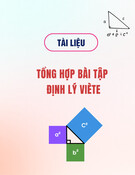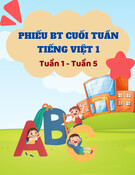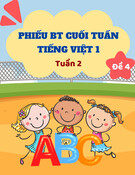
THCS DƯƠNG NỘI
ĐỀ CƯƠNG ÔN TẬP CUỐI KÌ 2 TIẾNG ANH LỚP 8
NĂM HỌC 2022-2023
PHẦN LÝ THUYẾT
Ngữ pháp:
I. Câu điều kiện loại 1 (Conditional type 1)
* Cấu trúc: If + S + V/V(s/es), S + will + V (nguyên thể)
Trong câu điều kiện loại I, mệnh đề “If” ta chia thì HIỆN TẠI ĐƠN và mệnh đề chính ta
chia thì tương lai đơn.
- Cách sử dụng: Dùng để giả định về một sự việc có thể xảy ra ở hiện tại hoặc tương lai.
Ví dụ: If she comes, I will go with her. (Nếu cô ấy đến, tôi sẽ đi với cô ấy.)
II. Câu điều kiện loại 2 (Conditional type 2)
* Cấu trúc: If + S + V-ed/cột 2, S + would/should + V (nguyên thể)
Trong câu điều kiện loại II, mệnh đề “IF” chia thì QUÁ KHỨ ĐƠN và động từ trong
mệnh đề chính ta sử dụng cấu trúc: would/ should + động từ nguyên thể.
- Cách sử dụng: Dùng để giả định về một sự việc không thể xảy ra ở hiện tại hoặc tương
lai.
Ví dụ: If they had a lot of money now, they would travel around the world.
(Nếu bây giờ họ có nhiều tiền, họ sẽ đi du lịch vòng quanh thế giới.)
CHÚ Ý: Trong câu điều kiện loại II, nếu mệnh đề “if” sử dụng động từ “to be” ở thì quá
khứ đơn thì ta chỉ sử dụng “to be” là “were” với tất cả các ngôi.
Ví dụ: If I were you, I wouldn’t stay at home now.
(Nếu tôi là bạn, tôi sẽ không ở nhà bây giờ.)
Unit 8. English Speaking Countries
Ngữ pháp:
Các thì hiện tại (Present Tenses)
Thì Cấu trúc Dấu hiệu nhận biết
Hiện tại đơn * Với động từ thường:
S + V_s/es + O
* Với động từ tobe:
S + am/is/are + O
Các trạng từ:
every day/week/month/year…
in the morning/afternoon/evening…
always, usually, often, sometimes, seldom, rarely,
frequently…
Hiện tại tiếp
diễn
S + am/is/are + V_ing
+ O
now, at the moment, at (the) present, at this time,
right now, now…
Look! ; Listen!
Hiện tại hoàn S + have/has + V_PII just, yet, never, ever, already, so far, up to now,
1

thành + O since, for, recently, lately (gần đây), until now, up to
present,…
Unit 9. Natural Disasters
Ngữ pháp:
I. Câu bị động (Passive Voice)
Thì Cấu trúc câu chủ động Cấu trúc câu bị động
Hiện tại đơn S + V_s/es
VD: People speak English here.
(Ở đây mọi người nói tiếng Anh.)
S + am/is/are + V_PII
VD: English is spoken here.
(Tiếng Anh được nói ở đây.)
Hiện tại tiếp diễn S + am/is/are + V_ing
VD: They are building a new
house.
(Họ đã xây một ngôi nhà mới.)
S + am/is/are + being + V_PII
VD: A new house is being built.
(Một ngôi nhà mới đang được xây.)
Hiện tại hoàn
thành
S + have/ has + V_PII
VD: We have cleaned our car.
(Chúng tôi đã làm sạch ô tô của
mình.)
S + have/has + been + V_PII
VD: Our car has been cleaned.
(Ô tô của chúng tôi đã được làm
sạch.)
Quá khứ đơn S + V_ed/V2
VD: Someone cleaned the room
yesterday.
(Hôm qua ai đó đã lau dọn
phòng.)
S + was/were + V_PII
VD: The room was cleaned yesterday.
(Hôm qua căn phòng đã được lau
dọn.)
Quá khứ tiếp diễn S + was/were + V_ing
VD: They were making a cake
when I arrived.
(Khi tôi đến họ đang làm bánh.)
S + was/were + being + V_PII
VD: A cake was being made when I
arrived.
(Khi tôi tôi bánh đang được làm.)
Tương lai đơn S + will + V_nguyên thể
VD: The government will pass
the new law next month.
(Tháng tới chính phủ sẽ thông
qua luật mới.)
S + will + be + V_PII
VD: The new law will be passed next
month.
(Tháng tới luật mới sẽ được thông
qua.)
Tương lai tiếp
diễn
S + will be + V_ing
VD: She will be singing a song
when the prime minister comes
in.
(Khi thủ tướng bước vào cô ấy sẽ
đang hát 1 bài hát.)
S + will be + being + V_PII
VD: The song will be being sung
when the prime minister comes in.
(Khi thủ tướng bước vào bài hát sẽ
được cất lên.)
2

II. Thì quá khứ hoàn thành (Past perfect)
1. Công thức sử dụng thì quá khứ hoàn thành
- Khẳng định: S + had + Ved/P2
Ví dụ: I had done my homework before last midnight.
(Tôi đã làm xong bài tập về nhà trước nửa đêm qua.)
- Phủ định: S + had + not (hadn’t) + Ved/P2
Ví dụ: He hadn’t eaten before he finished the job.
(Anh ấy đã không ăn gì trước khi làm xong việc.)
- Nghi vấn: Wh-words + had + S + Ved/P2?
Ví dụ: What had she thought before I asked the question?
(Cô ấy đã nghĩ gì trước khi hỏi câu hỏi này?)
2. Cách sử dụng thì quá khứ hoàn thành
- Khi hai hành động cùng xảy ra trong quá khứ, ta dùng thì quá khứ hoàn thành cho hành
động xảy ra trước và quá khứ đơn cho hành động xảy ra sau.
Ví dụ: Lan said she had been chosen as a beauty queen two years before.
(Lan nói rằng trước đó hai năm, cô ta từng được chọn làm hoa hậu.)
- Thì quá khứ hoàn thành diễn tả hành động đã xảy ra và đã hoàn tất trước một thời điểm
trong quá khứ, hoặc trước một hành động khác cũng đã kết thúc trong quá khứ.
Ví dụ: We had had lunch when she arrived.
(Khi cô ấy đến chúng tôi đã ăn trưa xong.)
- Hành động xảy ra trong 1 khoảng thời gian trong quá khứ, trước 1 mốc thời gian khác
Ví dụ: I had lived abroad for twenty years when I received the transfer.
(Tôi đã sống ở nước ngoài hai mươi năm khi tôi nhận được sự chuyển đổi công việc mới.)
Jane had studied in England before she did her master's at Harvard.
(Jane đã học ở Anh trước khi học thạc sĩ tại Harvard.)
3. Dấu hiệu nhận biết:
- Từ nhận biết: until then, by the time, prior to that time, before, after, for, as soon as, by,
- Trong câu thường có các từ: before, after, when by, by the time, by the end of + time in
the past …
Ví dụ:
When I got up this morning, my father had already left.
(Sáng nay khi tôi dậy thì bố tôi đã đi rồi.)
By the time I met you, I had worked in that company for five years.
(Vào thời điểm tôi gặp bạn, tôi đã làm việc trong công ty đó được năm năm.)
3

Unit 10. Communication
Ngữ pháp:
I. Thì tương lai tiếp diễn (Future Continuous)
1. Khái niệm
Thì tương lai tiếp diễn được dùng để nói về 1 hành động đang diễn ra tại một thời điểm
xác định trong tương lai.
2. Cấu trúc
Câu khẳng định Câu phủ định Câu nghi vấn
S + will + be + V-ing
Ví dụ:
– I will be staying at the hotel
in Nha Trang at 1 p.m
tomorrow.
– She will be working at the
factory when you come
tomorrow.
S + will + not + be + V-ing
CHÚ Ý: will not = won’t
Ví dụ:
– We won’t be studying at 8
a.m tomorrow.
– The children won’t be
playing with their friends when
you come this weekend
Will + S + be + V-ing ?
Yes, S + will/
No, S + won’t
Ví dụ:
– Will you be waiting for the
train at 9 a.m next Monday?
Yes, I will./ No, I won’t.
3. Cách dùng
Dùng để diễn tả một hành động hay sự việc đang diễn ra tại một thời điểm
xác định trong tương lai.
Dùng để diễn tả một hành động, một sự việc đang xảy ra thì một hành
động, sự việc khác xen vào trong tương lai.
4. Dấu hiệu nhận biết
Trong câu có các trạng từ chỉ thời gian trong tương lai kèm theo thời điểm xác định:
– at this time/ at this moment + thời gian trong tương lai: Vào thời điểm này
– At + giờ cụ thể + thời gian trong tương lai: vào lúc …..
Ví dụ:
– At this time tomorrow I will be going shopping in Singapore.
(Vào thời điểm này ngày mai, tôi sẽ đang đi mua sắm ở Singapore.)
– At 10 a.m tomorrow my mother will be cooking lunch.
(Vào 10h sáng ngày mai mẹ tôi sẽ đang nấu bữa trưa.)
II. Những động từ được theo sau bởi "to V"
1. Các động từ phổ biến được theo sau bới động từ nguyên thể có “to” là:
- afford: đáp ứng
- agree: đồng ý
- appear: hình như
- arrange: sắp xếp
- ask: yêu cầu
- manage: xoay sở, cố gắng
- offer: cho, tặng, đề nghị
- plan: lên kế họach
- pretend: giả vờ
- promise: hứa
4

- attempt: cố gắng, nỗ lực
- decide: quyết định
- expect: mong đợi
- fail: thất bại, hỏng
- hope: hy vọng
- intend: định
- invite: mời
- learn: học/ học cách
- refuse: từ chối
- seem: dường như
- tell: bảo
- tend: có khuynh hướng
- threaten: đe dọa
- want: muốn
- would like: muốn, thích
2. Ngoài ra, ta sử dụng to V trong các cấu trúc:
+ It takes / took + O + thời gian + to-inf (mất bao lâu làm gì)
It takes Nam two hours to do that exercise.
(Nam mất 2 tiếng để làm bài tập đó.)
+ Chỉ mục đích
I went to the post office to send a letter.
(Tôi đi bưu điện để gửi bức thư.)
+ It + be + adj + to-V ( thật … để ..)
It is interesting to study English.
(Học tiếng Anh thật thú vị.)
I’m happy to receive your letter.
(Tôi vui khi nhận được thư của bạn.)
+ S + V + too + adj / adv + to-V (quá... để...)
He is too short to play basketball.
(Anh ấy quá thấp để chơi bóng rổ.)
+ S + V + adj / adv + enough + to-V (đủ ....để....)
He isn’t tall enough to play basketball.
(Anh ấy không đủ cao để chơi bóng rổ.)
+ S + find / think / believe + it + adj + to-V (nhận thấy...)
I find it difficult to learn English vocabulary.
(Tôi thấy học từ vựng tiếng Anh thật khó.)
3. Chú ý:
Một số động từ phụ thuộc vào tân ngữ mà có 2 cách chia động từ khác nhau:
- allow / permit / advise / recommend + O + to-inf
Ex: She allowed me to use her pen.
(Cô ấy cho phép tôi sử dụng bút của cô ấy.)
- allow / permit / advise / recommend + V-ing
Ex: She didn’t allow smoking in her room.
(Cô ấy không cho phép hút thuốc trong phòng của cô ấy.)
Unit 11. Science and Technology
Ngữ pháp:
5



![Tài liệu tham khảo Tiếng Anh lớp 8 [mới nhất/hay nhất/chuẩn nhất]](https://cdn.tailieu.vn/images/document/thumbnail/2025/20250806/anhvan.knndl.htc@gmail.com/135x160/54311754535084.jpg)










![Phiếu bài tập cuối tuần Tiếng Việt 1 tuần 2 đề 2: [Hướng dẫn chi tiết]](https://cdn.tailieu.vn/images/document/thumbnail/2025/20250728/thanhha01/135x160/42951755577464.jpg)

